
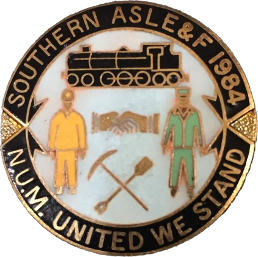
NATIONAL UNION OF MINEWORKERS STRIKE COMMENCED
LOCOMOTIVE JOURNAL
JANUARY 1984
THREE BRIDGES BRANCH
Our AGM was held on December 11. Head Office correspondence concerned various elections, and the meeting voted for its chosen candidates for the parliamentary panel, TUC regional council, and the appeals committee. We also nominated our AAD delegate.
There followed a district council report from Bro. Cyril Blundell, the contents of which helped us from various AAD resolutions. It is hoped that the AAD will take notice of this branch’s call for no negotiations to alter either PNBs, or the maximum single-manned driving time for footplate staff.
The subject of cross cover also cropped up in Cyril’s report, and it was decided that with the amount of cross covering done by Three Bridges footplate staff, it was now time to ban overtime on spare duties, if cross covering is involved.
After a lengthy and detailed discussion the meeting passed on to the LDC report given by secretary Ray Young. Ray told us that the LDC had at long last agreed a flexible roster with management based on a link system of rotating around an eight week cycle, thus ensuring only 312 rostered hours for each driver every eight weeks.
This rotating roster had been working at the depot since November 28, replacing management’s roster which had been implemented with no staff side agreement on October 3. This turn had repacked the eight hour day at Three Bridges.
Finally it was time for the election of officers for 1984; a number of changes took place, but it’s to the credit and harmony of this branch that all our 1984 were elected unopposed.
DEREK ABRAHAMS
BRANCH REPORTER
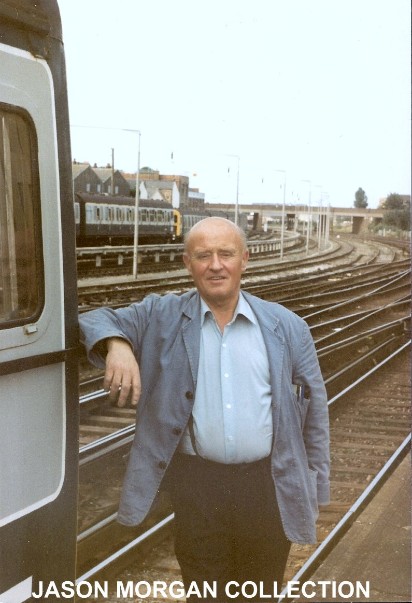
LOCOMOTIVE JOURNAL
JANUARY 1984
My wife, family and I would like to express thanks to Mr. Black and Mr. T. Bevan and all members of Selhurst club along with my ex-workmates, for the generous presentation and flowers they gave us on Thursday 24 at Selhurst Staff Association Club.
LOCOMOTIVE JOURNAL
JANUARY 1984
PRESERVED RAILWAYS
In reply to Bro. Lovell’s letter in the December issue criticising my account of week working on the West Somerset Railway, I am amazed that anyone could turn what I simply regarded as an inexpensive but enjoyable holiday into a political issue.
Let me assure him that I have been a member of A.S.L.E.F. since 1956 and at present a member of the Horsham branch committee. I am also a third generation railwayman who is totally disillusioned by the efforts of successive governments and managements sabotage what was once the world’s finest railway system by providing an unattractive service then closing “un-economic” lines and sacking staff who have given all their working lives to the railway industry, while at the same time creating jobs for the boys in the clerical and management grades.
One of the reasons for my volunteering to spend half of my annual leave on the WSR was that my bank account was somewhat depleted due to our dispute in 1982, when I spent many hours attending meetings and standing in picket lines (which I would readily go again if the situation demanded) in an attempt to preserve the rapidly eroding rights and conditions of the Society’s members!
To take up Bro. Lovell’s point, redundancy in the West Country, I have twice experienced this situation; once in 1958 when Yeovil Pen Mill Loco closed, when I moved to Weymouth as a cleaner, and again in 1968 when I took promotion in order to avoid redundancy. I have been driving at Dorking EMUT.
The Taunton to Minehead branch was closed by British Rail as uneconomical and was subsequently re-opened by the WSR which is now performing a very valuable service for the community and providing jobs for several people, not to mention preserving a part of our history. Are we as a Society opposed to this?
Finally, in response to Bro. Lovell’s point about “slave labour”, I am at the moment working on the world’s most heavily congested commuter railway with clapped out stock, stopping at up to one hundred stations in a day’s work with sometimes as little as six minutes turn around between trips.
Trains are controlled by a brand new signalling system which fails monotonous regularity resulting in chaos and frustration for passengers and staff. I am “managed” by hordes of supervisors, inspectors and management who are supplied with personal two way radios and the latest VDU equipment, and none of whom seem able to make even the simplest decisions without first consulting the mysterious voice on the other end of the control phone.
The contempt with which I am treated by administrative staff was again proved to me last week when I was stopped a day’s pay for attending an unavoidable hospital appointment because, to quote my local administrative assistant, “we do not pay you to go to the hospital”.
Comparing this with the respect with which the management of the WSR treats its staff, and the resulting high morale which exists on the WSR, I know where I would prefer to spend the rest of my service.
DAVE SQUIBB
DORKING EMUT
LOCOMOTIVE JOURNAL
APRIL 1984
THREE BRIDGES BRANCH
The branch meeting held at Three Bridges station on March 11 was, as usual, attended by a very high percentage of our membership.
The meeting started with some amendments to our standing orders, followed by discussion about one of our member who had stood as an unofficial candidate in a recent LDC election. the branch decided that although the person concerned had been roundly defeated, the incident had to be reported to the Executive Committee.
We the moved on to elect our ex-branch secretary, Bro. Dave Shopland, as a co-opted LDC member. We were also forced to switch the position of a few of our branch committee members. One reason was the imminent departure of Bro. Fred Stevens who is soon to be transferred to Battersea. Fred has been a loyal branch committee member at Three Bridges for a number of years. Eddie Keith, Dennis Mould, and Jack Smith from the Gatwick Airport shunt drivers link. This is soon to disappear; all four of them will move to Stewarts Lane (near Victoria) as part of the new Victoria - Gatwick Airport service. The Three Bridges branch wishes all four of them the best of luck in the future.
The rest of the meeting’s business included: nominations for Assistant General Secretary; AAD amendments; and further debate on local matters. Thus a long and enjoyable meeting was brought to an end.
DEREK ABRAHAMS
BRANCH SECRETARY
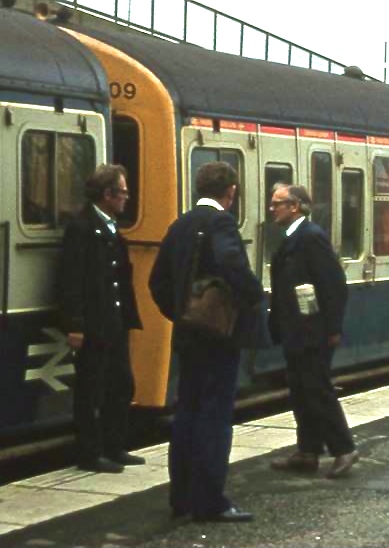
TONY WATSON COLLECTION
Three Bridges drivers at Gatwick Airport
Left L-R Johnny Vigar, Don Barrat & Fred Stevens
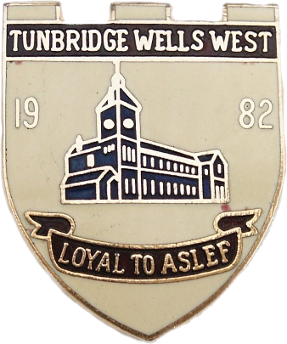
Tunbridge Wells Meeting
Sunday 15th April 1984 at 10.00 a.m.
at the Welfare Rooms Tunbridge Wells Central Station
T.W.W. STRIKE BADGE
On any other business Bro. I. Bond asked about the depot could have a strike badge after a short debate on how many we should make. It was decided that Bros. Bond and MacDonald should make some designs for the next Branch meeting and the Secretary will post a list up to see how many badges each man wants.
Sunday 20th May 1984
The Chairman then moved over to the floor to discuss the subject of badges. Bro. I. Bond had brought with him some designs based on a shield type badge with a picture of the old clock tower in the centre.
It was discussed how many we should get. The Secretary had phoned up the firm who advertised in the Locomotive Journal. April 1984 and the prices he had got to show that by only getting say 50 done. It would work out around £4.50 each where as 400 would be lass than a £1 each. It was there voted on weather we should ave two badge. This was put to the floor by the Chairman. That this depot have two badges made of only 50 in number made the other of 400 in number. For 7, against 0 and abstention 1 = 8 members all voted.
The first badge of 50 in number will be of shield type as submitted by Bro. I. Bond with the colours yellow, blue and red.
The second badge of 400 in number will be of the shield type as submitted by Bro. I. Bond with the colour yellow, blue and red but the red and blue will be reversed in the second badge. The amount will be worked out and the charge to other than Tunbridge Wells drivers will be higher, the profits going to branch funds.
A vote of thanks was given to Bro. I. Bond and the Secretary instructed to write to Bro. I. Bond with a letter of thanks. All in favour.
On the question of how we are going to pay for them it was suggested that we as for the money first and they order the badges from say from each member then they will be reimburse when the final figure has been sorted our.
Sunday 16th June 1984
The chairman then moved on to the badges being made by this Branch. The Secretary had received from Marks of Distinction a quote which inform us that each badge would cost £1.10 and the Secretary informed the members present that he had sent to Marks of Distinction a cheque £80.50 as a deposit for work to be done. Money coming into the Branch was over £20.00 to date and the Chairman asked that if members wishing to order would they pay in advance so we the Branch would have the other £313.00 when the badges were done (not including P/P).
Sunday 15th July 1984
On any other business, the Secretary, Bro. J. Carney, asked if he could list the minutes the 39 members who are entitled to the special badge being made as some confusion was around to who may or may not be entitled to them.
Proposed by Bro. J. Carney and seconded by Bro. I. Bond. That the following 39 drivers second by Bro. I. Bond. That the following 39 drivers who may or may not at Tunbridge Wells West are entitled to the Tunbridge Wells West special badge because they were at the depot on July 12, 1982 and where on the Branch’s books up to or in between the May Branch meeting 20th, 1984.
It was then put forward by Bro. J. Carney and seconded by Bro. I. Bond. That all surplus of the above special badges be held in the Branch’s hands until all have claimed. All in favour.
The secretary did have a proof badge printed into lead. It was proposed by the Chairman and seconded by Bro. R. Simpson. That the proof badge goes into Branch files as part of the Branch’s property. All in favour.
It was suggested that Head Office gets one of our badges for Head Office Collection. This was proposed by Bro. I Bond and seconded by Bro. J. Carney. That a badge from Tunbridge Wells West go to Head Office of A.S.L.E.F. for their badge collection. All in favour.
2, Ashdown
3, Baldwin
4, Bodium
5, Breeds
6, Brown J.J.
7, Brown R.
8, Carney
9, Cocks, J.
10, Coomber
11, Cox
12, Crampton
13, Diplock
14, Dodwell
15, Dougherty,
16, Ellard
17, Elston
18, Exley
19, Gent
20, Harper
22, Herriett
23, Knowles
24, Love
25, Luckhurst
26, McDonald
27, Neal
28, Nye
29, Ovenden
30, Pepper
31, Rigby
32, Stephenson
33, Sullivan
34, Taylor
35, Dore
36, Simpson
37, Marchant
38, Staggs
39, Bond
39 drivers in total. All if favour
Sunday 19th August 1984
The Chairman then moved on to the next
item on the agenda, which was badges. The
Secretary read out the list to make sure members were aware of who was entitled to them. It was then brought about Bro. R. Bridger who did in fact came into work during the 1982 strike because of fears about his pension. The Secretary was asked what he had said to Bro. Bridger. The Secretary that made him join the strike. The Secretary said he had found that weather we all got sacked or not because Bro. Bridger was over 62 his pension right was safe, but also B.R. could not touch his pension as it had no control over it. It was then the Secretary gave his assurance to him that if he joined us on strike no members knowing the reasons for his return to work would not take any action against him. It was then proposed by Bro. A. Herriett and seconded by Bro. R. Harris. That Bro. R. Bridger be entitled to a special Tunbridge Wells West badges. The vote was recorded as For the motion 11, against 1 & abstention 0 = 12 members voted. It was then asked by the member to record in the minutes the reasons why he was allowed the badge and why he worked which has been done.
02, I. Bond
03, D. Nye
04, R. Simpson
05, J. Staggs
06, F. Crampton
07, P. Bodiam
08, D. Dore
09, A. Rigby
10, R. MacDonald
11, I. Breeds
12, R. Brown
13, P. Elston
14, S. Neal
15, A. Ashdown
16, R. Harper
17, R. Luckhurst
18, F. Diplock
19, W. Overden
20, C. Exley
22, R. Coomber
23, A. Herriett
24, M. Allen
25, R. Bridger
26, L. Stephenson
27, C. Taylor
28, H. Marchant
29, A. Dodwell
30, G. Ellard
31, R. Harris
32, H. Love
33, A. Cox
34, P. Pepper
35, J. Carney
36, K. Knowles
37,
38, B. Gent
39 W. Baldwin
The meeting welcomed Bro. Bill Ford from Tonbridge branch and invited him to do the draw for the badges as it was discussed and adopted that a raffle tickets be put in the box and the 38 men who were entitled to as mentioned at the July meeting. The first number from the list got No.1 badge and so on the names and numbers did come out as (see list above).
It was decided by all member attending Bro. D. Ford from Tonbridge be allowed a badge from the extras as such was allowed No. 40.
It was suggested and again excepted by all that Head Office be given No.50 and one of the ordinary type for their collection.
That left eight badges Not. 41 to 49 inclusive, it was decided by the members present to allow those member who have been listed up at the depot a chance of having a second badge, it was made known by members that ten where interested and there were only eight. Bro. D. Ford did draw out eight tickets and the successful members were 41, Bro. W. Baldwin, 42, Bro. R. MacDonald, 43, Bro. I. Bond, 44, Bro. S. Neal, 45, Bro. R. Harris, 46, Bro. J. Carney, 47, Bro. K. Knowles, 48, Bro. L. Stephenson & 49, Bro. P. Elston.
The list of names may change as men change badges but it was the wish of the members that members should make it know who has these badges with a view of making sure only members who should have them have got them.
It was then proposed by Bro. A. Herriett and seconded by Bro. P. Elston. That the above list of names be executable to this Branch. All in favour.
Sunday 16th September 1984
The Chairman notices as then brought to the attention that Bro. V. Hodges N.U.R. member had purchased one of our strike badges and then sold it to another N.U.R. member for £5. When the secretary had still got some of the badges at £1.50. it was then suggested by Bro. R. Harris that the Secretary write to Bro. V. Hodges and inform him that the Branch is upset to hear that he sold the badge so shortly after paying for it and then obtaining another from the Secretary.
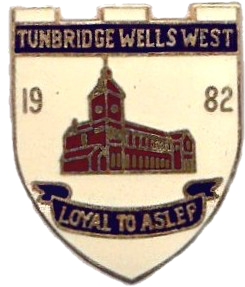
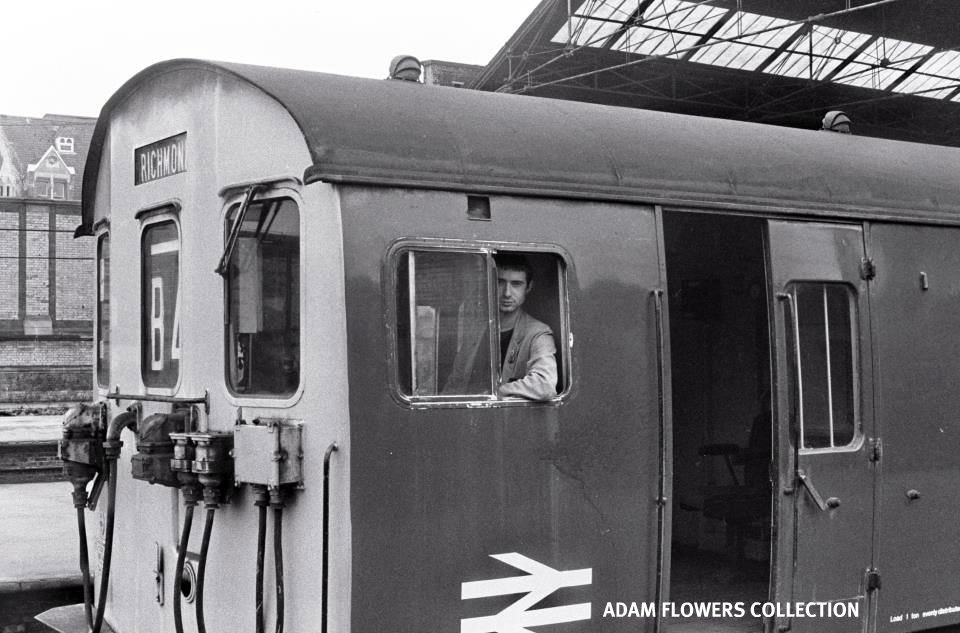
Driver Adam Flowers at Broad Street
With the closure of Broad Street in c1984 Adam moved to Brighton E.M.U.T.
Adam served as Broad Street Branch Secretary up until the depot closed
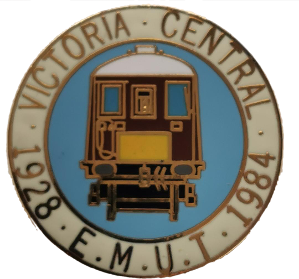
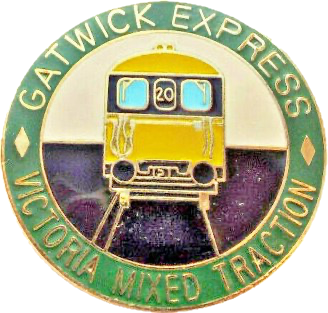
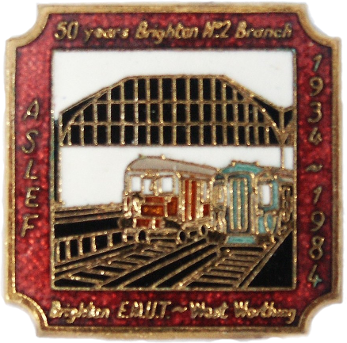
LOCOMOTIVE JOURNAL
JUNE 1984
WHY WE WORK OVERTIME
Overtime is being worked at Selhurst. I cannot be precise as to the exact amount because it is being worked at the request of train crew supervisors, but rest days are being worked on an if and when required basis. And the current position at Selhurst almost assures the overtime to any driver making himself available for work on his rest day.
Before this state of affairs is condemned out of hand by the Executive Committee or any one else. I would like to draw attention to the following facts and observations.
The situation at Selhurst has resulted from two things.
1, The crass stupidity of Southern Region (Central Division) management.
2. Our own PT&R arrangrements.
In 1983 two decisions by S.R. (Central Division) management led to our plight; the closure of Coulsdon North EMUT depot and the closure of West Croydon EMUT depot.
Between them Coulsdon and West Croydon had 58 diagrams. Management decided to 56 of these diagrams to Selhurst and the senior driver at each depot took resettlement. The depots closed on August 14, 1983; only forty drivers opted to come with the work to Selhurst which left us with 16 vacancies. We could not advertise these until the September list. Before September we lost a further six (14a moves etc) and so we advertise for 22 drivers on Vacancy list 5. remember we were still running a trains service. Of the 22 successful applicants, not one was Southern man, ten were relief drivers needing nine week course, the remainder require an MP12 course and all will require extensive route training. Southern Region do not have room at the training school meaning that some of our new drivers will have to at wait at least three months for a vacancy! All the 22 have registered 8b moves away from the Southern Region.
Soon after, we lost a further eight drivers (14a moves) and advertised for eight on vacancy list 6. Only two of the successful applicants were Southern men and all eight have registered moves away from Selhurst. three of them are relief drivers needing a nine week course and the other five need MP12 courses; the training school remains just as crowded.
We have since lost a further 17 driver and another is to go within the next week.
The May cuts have taken nine diagrammed running turns away from us. Our establishment from May 14, 1984 will be 128; we are advertising ten on the March list.
The exact state of affair at this depot today is as follows; establishment, 136; vacancies, 17; training, 11; routes, 20; drivers not fully conversant with route in their respective links, 13.
Our situation is impossible; we have to work rest days. If overtime and rest day working is banned how on earth will we provide a service to the public? If we increase our establishment, where would we get the drivers from? Other regions? When would they be operational? 1985? And would they stay in Selhurst?
We are a single manned depot, and I repeat, if we stop working rest days we will give management a golden opportunity to cut more trains. If they so wish, they will make cuts anyway, but we at Selhurst do not wish to allow them to place the blame on the non-co-operation of staff.
I will end on a rather sour note. Drivers at some nearby depots, although they will not do Selhurst work when they are spare, will do Selhurst work on Sunday and rest days. They tell management that the National Conditions of Service and A.S.L.E.F. do not permit them to cross cover, but it’s OK on rest days.
Selhurst branch would welcome a visit by any EC member or an AAD delegate from a branch recommending a rest day ban. If they come, I hope they bring the answers to our problems.
R. DAINTY
SELHURST EMUT
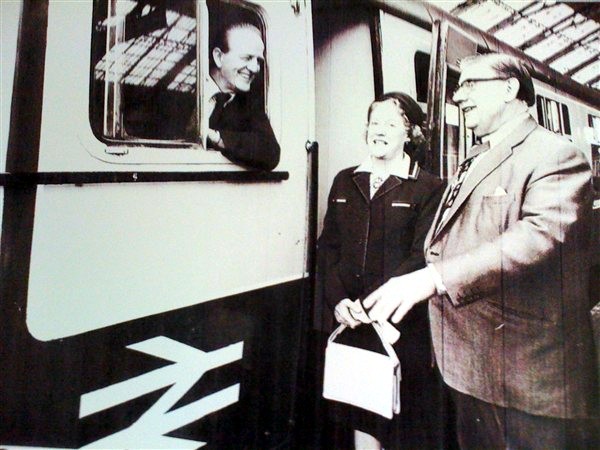
TAYLOR FAMILY COLLECTION
Maurice "Cocker" Taylor (c1984)
Maurice is seen chatting to the Mayor and Mayoress of Brighton.
LOCOMOTIVE JOURNAL
JUNE 1984
GEORGE PULLEN
It is with deep sorrow that I report the death of Bro. G.P. Pullen at the age of 60 years. George died in hospital on march 5, after a short illness. he leaves a wife, a son and a daughter. George, a highly respected member of our depot, will be greatly missed by us all, especially the Motive Power Social Fund to which he devoted a lot of his time.
LOCOMOTIVE JOURNAL
JULY 1984
CHICAGO STYLE
Who runs British Rail? The British Rail Board will claim they do, which in a manner of working is true. But seen in its more than an expensive extension of an interfering British government.
Daily mirror, 6 June 1984: “That British Rail Chief, Mr. Bob Reid was given instructions by the Transport Secretary, Mr. N. Ridley, on how to handle his pay claim.”
Whil Mr Reid was playing footsie under the table with Mr. MacGregor, Mrs. T. was working in her bid to destroy the N.U.M.
With the cloud of Serpell overhanging, political manipulation can only mean disaster for the railways. The anti-railway lobby in parliament has the resources to infiltrate BRB, and once established the railway’s future will begin to look very uncertain to say the least. These people are no more than “Chicago gangsters” under a shroud of respectability.
If we as railwaymen, management and staff alike, allow our railways to be continually used as a political football, we shall all be out of a job and the country will be without a railway network.
I pray to God that good will prevail.
R.J. HARRIS
TUNBRIDGE WELLS WEST
LOCOMOTIVE JOURNAL
JULY 1984
I wish to express my sincere thank to the Society and its solicitors, also to Mr. Alan Taylor, secretary of Norwood branch, for help in bringing a successful conclusion to my accident claim recently concluded in the courts.
I realise that without the support of A.S.L.E.F. I would not have been able to pursue this claim against the other car driver, as the cost would have beyond my means.
It is at times like these that the value of belonging to a trade union becomes fully apparent. In appreciation I have forwarded a cheque to the Orphan Fund.
D. GILBERT
NORWOOD JUNCTION
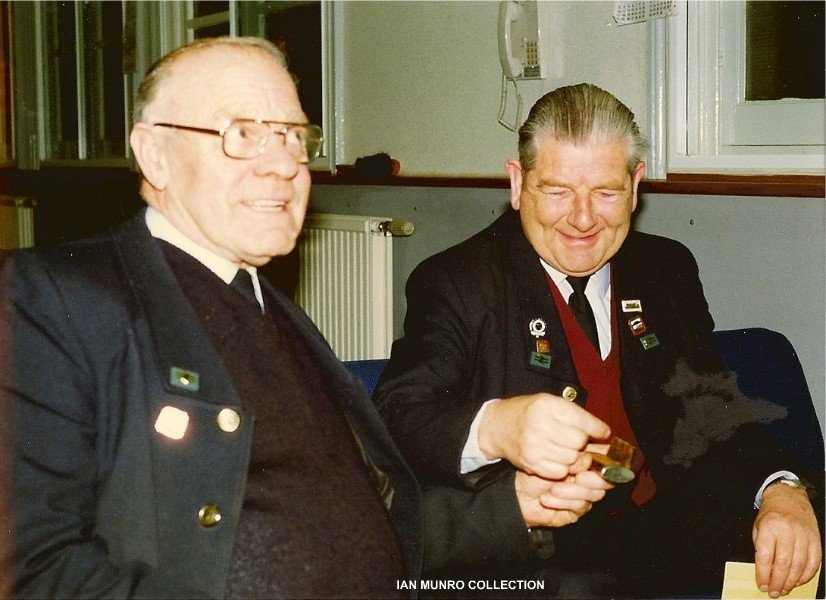
Brighton E.M.U.T Drivers
Cyril Hutchings (and his snuff box) & Fred Locke (B'ton LDC)
in Brighton messroom mid 1980s
LOCOMOTIVE JOURNAL
AUGUST 1984
THREE BRIDGES BRANCH
As usual the branch meeting held on Sunday, July 15 was very well attended . it was the third quarter meeting and we again managed to exceed a fifty per cent attendance, which has been the average for this year.
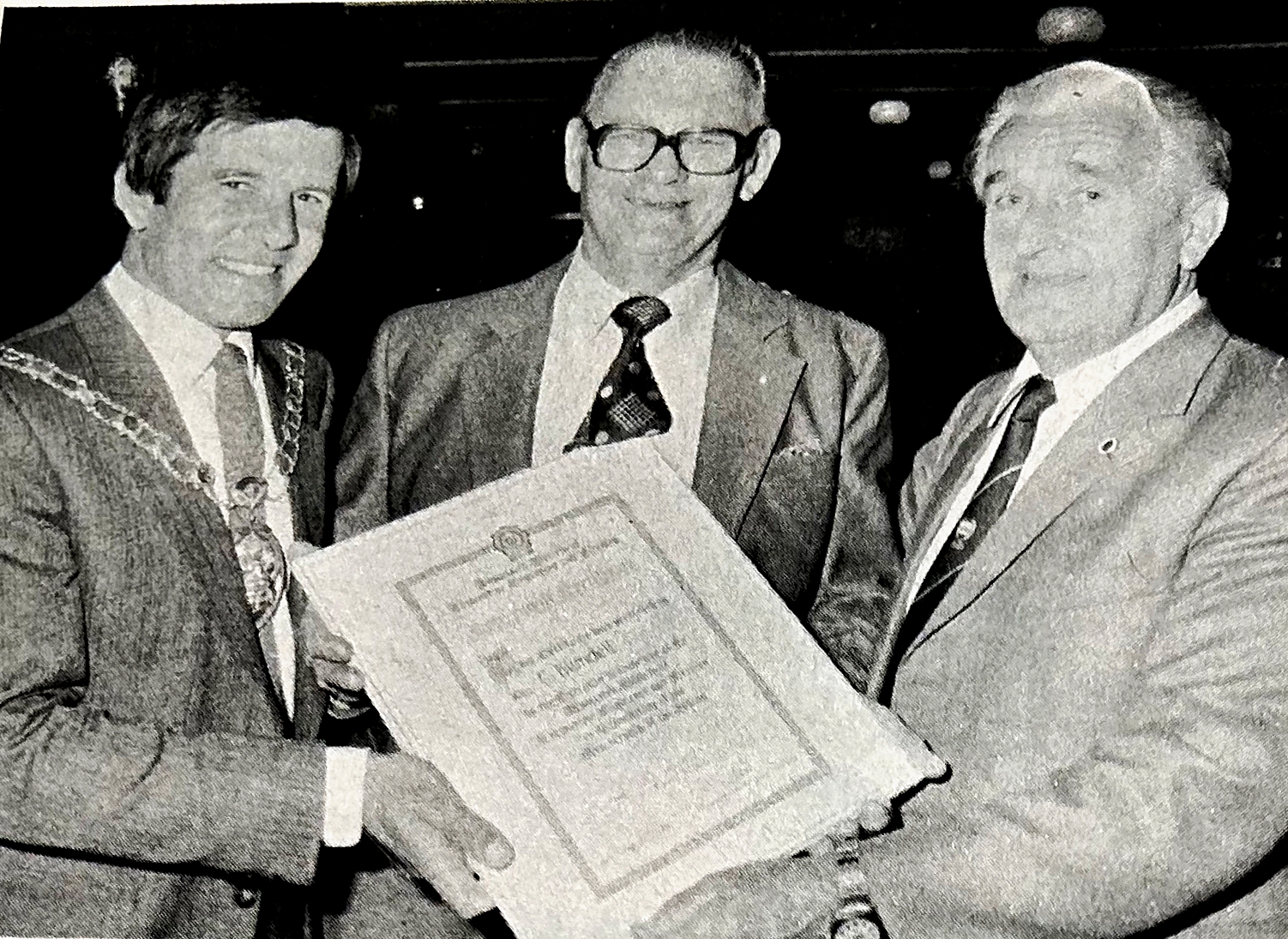

Ian Munro Inside West Worthing Shed c1984
LOCOMOTIVE JOURNAL
SEPTEMBER 1984
HUNGRY, BUT DETERMINED
Derek Abrahams of Three Bridges Branch went to see what was happening at one Yorkshire pit. This is what he found.
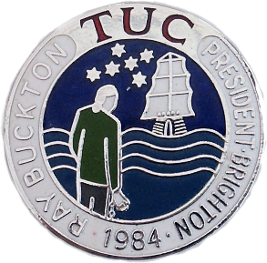
Railway accidents on British Railways
Southern Region
Central Division
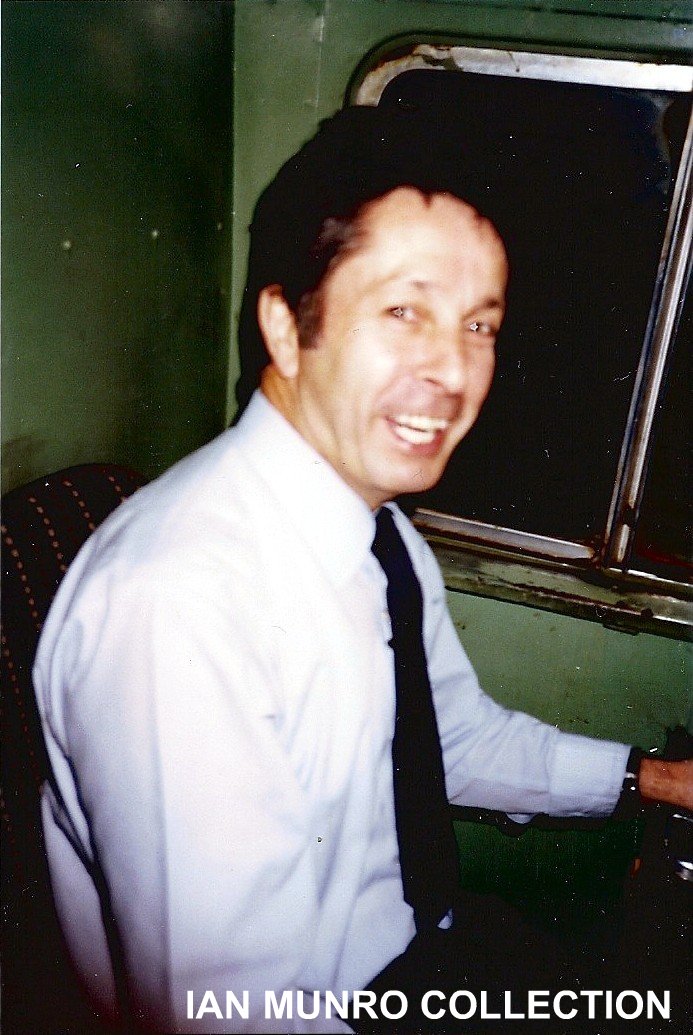
Littlehampton Driver Gordon Rooke